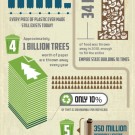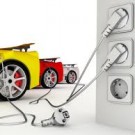
By: Jim Eagles
There are many ways of reducing your environmental impact; unfortunately, many are costly. You may want to consider the following but this article focuses on strategies that also save you money while reducing environmental impact.
Hybrid cars can be 20% more expensive than the equivalent gas-powered cars. At current gas prices, analysis suggest that lifetime (of the car) savings do not offset the initial cost premium.
Organic vegetables can be anywhere from 15% to 30% more expensive than regular.
Recycled paper can be often 20% more expensive than regular paper.
All require paying a premium.
But what if there were ways to... Read More

Its Electric Tuesday!
Here are some great Facts about Electricity!!
Fun Facts source: Evolve Green
In 1978, only eight percent of households had microwave ovens. Today, 83 percent have them.
The size of a typical home has increased from 1100 to 1800 square feet over the past ten years.
As late as 1993, high-tech paraphernalia like computers, printers and video games had a negligible effect on power usage. Today, it's estimated to account for more than 13 percent of a typical household energy budget. By 2020, it could be as much as 25 percent.
In 2002, the following amount of electricity, in gigawatt-hours, was generated... Read More

Electric Cars should not still be a thing of the Future!
By: Gavin Mcleavy
It’s really simple!
Battery powered cars have been made and solar energy has been around for years. Now cities with any sense of progress need to step up and take the leap of faith.
Politicians have been using it as a vote getter for years but they aren’t doing anything with it, just false promises. ITS HERE!! WHY AREN'T WE USING IT?
Some people will argue it takes too long to charge. You’ll waste more money on electricity than the gas, they won’t have enough power.
The fact is most people... Read More

Article by www.thegreenists.com
Posted on May 23, 2011 by Courtney
Please welcome today’s guest poster, Jakob Barry.
Whether at home, in the office, or at school, people who spend most of their time indoors can’t afford to breathe unhealthy air. Even limited exposure can compromise concentration and creativity, as symptoms associated with breathing bad air include laziness, dizziness, mood swings, and stomach sickness. Long-term exposure may even lead to chronic conditions.
For these reasons and more, it’s important to monitor the quality of indoor air, which at its core is fairly simple when taking the following points into consideration:
1. Regular cleaning: This may seem obvious, but weekly... Read More

Today is the day of the week to be conscious of your consumption and your personal carbon footprint! Be aware of the trash you create and try and find ways around it.
Below are some suggestions, from a great site No Impact Man.
No soda in cans (which means we’re probably less likely to get cancer from aspartame).
No water in plastic bottles (which means we get to keep our endocrines undisrupted).
No coffee in disposable cups (which means we don’t suffer from the morning sluggishness that comes from overnight caffeine withdrawal).
No throwaway plastic razors and blade cartridges (I’m staging the straightedge razor comeback).
Using non-disposable feminine-hygiene products that... Read More


























